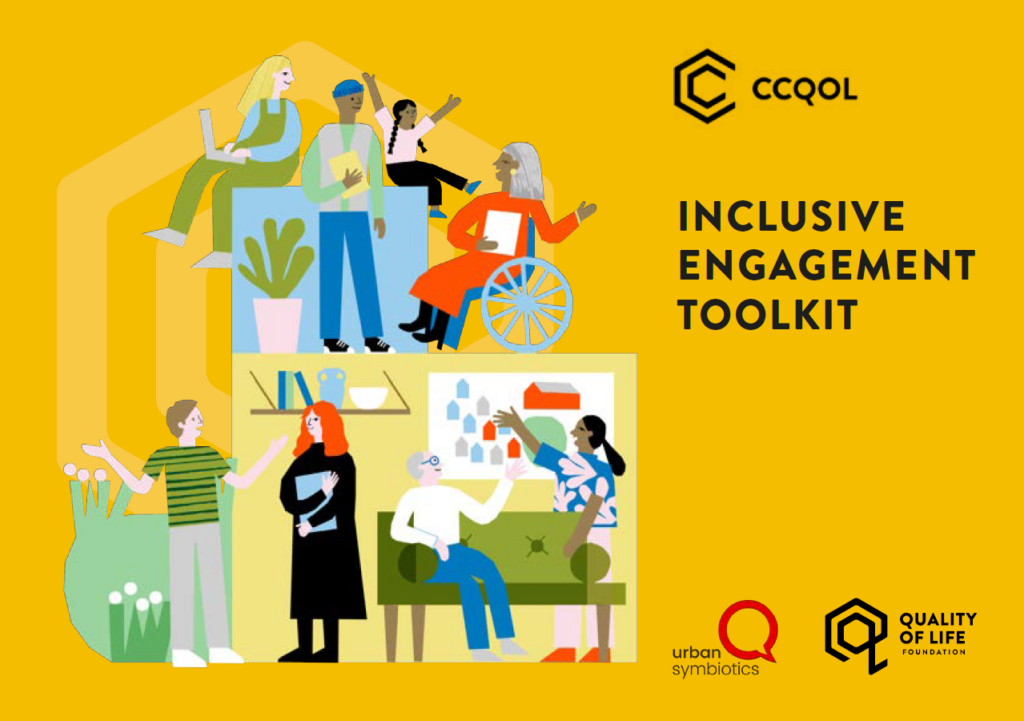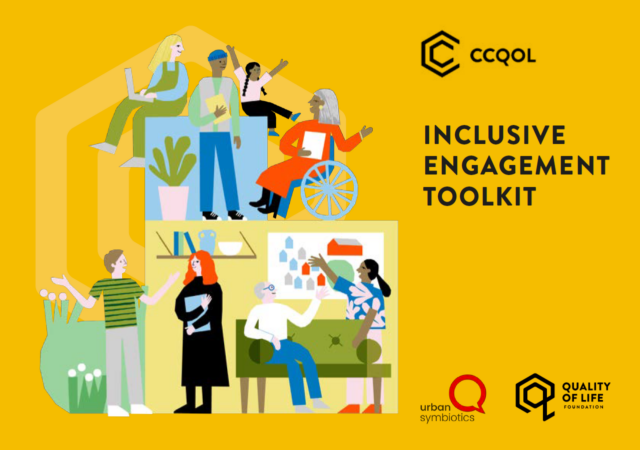The Inclusive Engagement Toolkit outlines the key steps and principles for enabling equal access to opportunities and resources during consultation and engagement processes for planning.
The toolkit is for anyone interested in undertaking or participating in an inclusive engagement process, including community groups, individuals and built environment professionals. It is also for companies or institutions that develop or shape new places, such as local authorities, resident associations, charities, and developers.

Community Consultation for Quality of Life
The Inclusive Engagement Toolkit is one of the recent publications to come out of the research project Community Consultation for Quality of Life (CCQOL). CCQOL is an Arts and Humanities Research Council funded project at the University of Reading looking at creating a new hybrid model for community engagement with planning.
The project involves an online platform – where people can contribute to digital maps of their local area – and face-to-face engagement through urban rooms. Urban Rooms are shared spaces that celebrate the diversity of neighbourhoods. In Urban rooms, communities can learn about the past present and future of their town or city and develop agency to voice their opinions.
The project began in mid-2021 and since then has tested Urban Rooms in four places – Reading, Cardiff, Edinburgh and Belfast – for a month each. The project is a collaboration with the Quality of Life Foundation, Urban Symbiotics, Commonplace, Cardiff University, University of Edinburgh, and Ulster University.
The development of the toolkit
Participation in planning is important, and as the literature review for the project shows, it is the key to building resilience and wellbeing in the community.
The way consultation has been conducted in the built environment industry leads the community to feel left out, or not involved from the beginning, and there are concerns about what happens once their views have been collected. The system is developed such that it has become a tick box exercise for the developers and builders, instead of making communities an integral part of the process.
As the CCQOL team travelled across the four nations and planned engagements with various groups, new learnings came to the fore.
From planning engagement on paper, to mapping out organisations and communities in the neighbourhood, the team addressed various challenges. Reaching out to existing groups to develop new partnerships, using social media and varied art and cultural tools to inform and engage, the CCQOL team tapped into existing resources and learnt new skills.
The team developed key steps in the inclusive engagement process through the four pilots, including: identifying barriers to participation and addressing them, being adaptive and ready to make changes depending on context, being sensitive to the process and the language being used, having the intention that nobody is left behind, and introducing incentives for increasing participation.
From the start of the consultation process to the end, these steps are integral to making people feel that their views are valuable and to increasing repeat participation.
Why an inclusive engagement toolkit?
Inclusion is central to the delivery of a democratic planning system and is essential in creating places that enable as many people as possible to thrive. There has been a greater acknowledgement of this in recent years. But organisations do not always know how to best go about ensuring that their practices and processes are as inclusive as they can be.
Based on in-depth research, the team has produced a simple, seven step toolkit to make it easier for professionals to design and deliver inclusive community engagement for planning. Download the toolkit.
What next for CCQOL?
The team is working on the reports across four nations, and a Code of Conduct for engagement and consultation. To keep updated with what’s happening please see the Community Consultation for Quality of Life website.
Ruchit Purohit is a Research Associate in the School of Architecture at the University of Reading and co-author of the Inclusive Engagement Toolkit.

